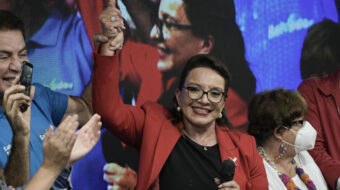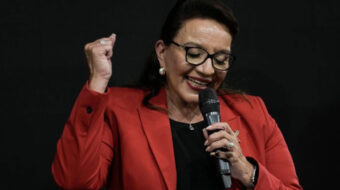President Porfirio Lobo inherited the mantle of a government taking power through a military coup. Perhaps his invitation to a U.S. reception September 23 for heads of state attending UN meetings in New York hints at burgeoning respectability in such circles.
That’s not the case at home. On September 17 Juan Barahona, leader of the National Front for Popular Resistance (FNRP), announced that 1.342.876 signatures had been collected over four months, each signifying approval of constituent assembly to shape a government with democratic possibilities. The Honduran population is 7.5 million.
One of the pretexts for the June 28, 2009 military coup deposing President Jose Manuel Zelaya had been the vote his government sought that day on approving a future constituent assembly. Its object would have been to institutionalize a government with democratic possibilities.
Coup plotters are not having a free ride. Independence Day commemorations on September 15 morphed into multiple parallel demonstrations involving unions and resistance activists. In Tegucigalpa, Porfiro Lobo and dignitaries held forth amidst high school bands and military display, while thousands of marchers mobilized by the FNRP filled nearby streets. “For repressors of the people, no pardon, no forgetting,” some cried out.
In San Pedro Sula, 50,000 FNRP marchers ran into tear gas assaults, water hoses, militarized police action, and armored vehicles. Dozens were wounded, 31 detained, and one killed. Radio broadcasters were dispersed and Café Guancasco band members were pummeled and their instruments destroyed. FNRP militants initiated a hunger strike at the mayor’s office.
Ten journalists have been killed so far this year, foreign journalists are threatened with expulsion, and the murder September 10 of Francisco Miranda Ortega represented the fifth assassination in less than three months of peasant union activists in Aguan province. Rich land grabbers there are expanding biofuel production. On September 12, 150 Special Forces troops, army trucks, and a tank defended the U.S. embassy against demonstrators in support of the Cuban Five political prisoners.
Social security unionists face serious repression. The murder September 17 of nurse Juana Bustillo followed other killings recently of leaders whose union is fighting social security privatization. The week before, Bustillo led a demonstration against state outsourcing of obligations. Her union belongs to the CUTH labor federation, a FNRP ally formed by leftist unions.
The CTH labor federation, created by North American unionists in the 1950’s, has backed post-coup governments. The Christian Democrat CGT federation moved from opposition to the coup to inaction when its leader Felicito Ávila entered the Lobo government as labor minister.
Striking teachers and National University employees are under the gun. University Rector Julieta Castellanos promoted charges of sedition and aggravated assault against 20 university employees. Three went to jail on September 11.
In the wake of its successful signature campaign, the FNRP will communicate results to international groups, and according to Barahona, will be “gathering in collectives of resistance in all regions” Focusing on a future constituent assembly and exit of the present regime, the FNRP does not espouse a political program. Zelaya, exiled in the Dominican Republic, was recently sworn in as Honduras’ deputy to the Central American Parliament, a post that, affording him diplomatic immunity, could facilitate his eventual return.
In communications disseminated September 23-24 on the FNRP web site, Zelaya, the group’s coordinator general, called for “creating consciousness of the roots of our difficulties.” The purpose of the coup, he suggested was “to stop transformative processes and realization of my socialist conception of development.”
“Indications and proofs of U.S. participation in the coup are multiple and conclusive,” he affirmed. He condemned the U.S. government for destroying “entire societies” though “violent acts and unjustified wars,” that achieve “the level of state terrorism.” Zelaya advised putting off electoral politics for now; they are “a trap to divide us and legitimize atrocities.”
Zelaya cited Wikileaks revelations on CIA death squads operating in Honduras. The CIA aside, a “Planning Workshop on National Security Strategy” unfolded recently at the Presidential House in Tegucigalpa, organized by the Washington- based Center for Hemispheric Defence Studies and attended by its own functionaries and Honduran military, congressional, and governmental figures, President Lobo included.
Two new U.S. naval bases appeared along this Honduran coast this year. And Florida’s Harris Corporation is into the first of a five-year $38 million contract to run communications at Washington’s Palmerola air base there.











Comments